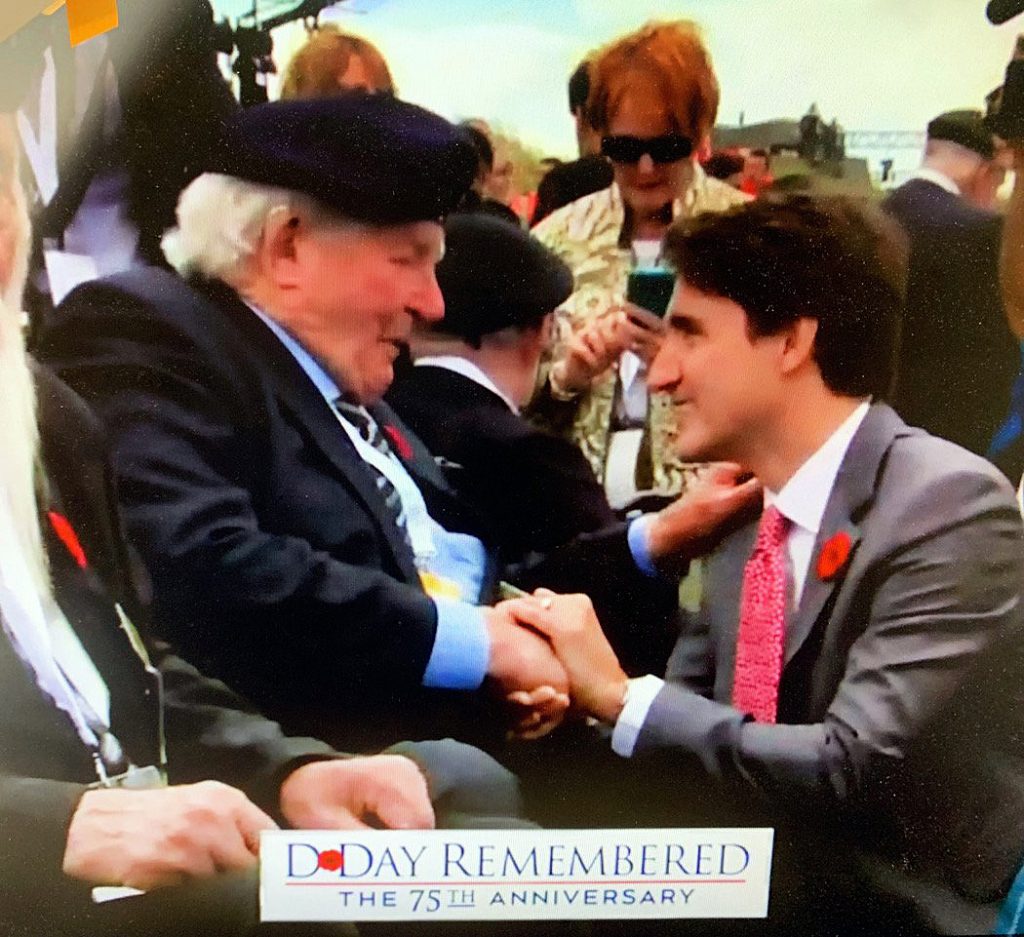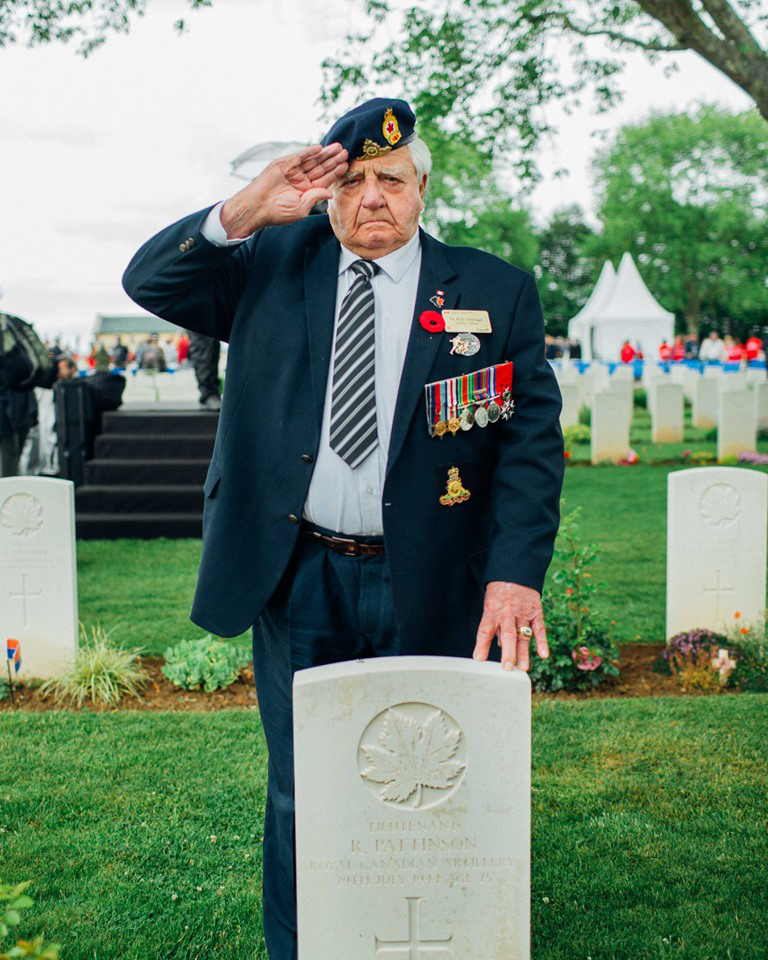WC war hero returns from France
WEST ARMITAGE – World War Two veteran Dr. Roly Armitage’s trip to France was a combination of pomp and circumstance, receiving honours from an entire country and reliving memories no young boy should have witnessed in the first place.
Armitage, 94, was one of about 40 World War Two Canadian veterans who made the trip to France from June 1 to June 9 to honour the 75th anniversary of D-Day and the Battle of Normandy. Armitage told West Carleton Online the story of this year’s celebration and the story of his first visit to Normandy from his kitchen table yesterday.
“I got so much given to me, I couldn’t bring it all home,” Armitage said. “The French people were there en masse. I must have had my photo taken four million times. People crowded around us all the time, saying thank you.”
A 13-year-old Dutch student named Emma Nenti presented Armitage with a letter of profound thanks.
“The students were turned loose and found a soldier,” Armitage said. “She wants to keep in contact.”
Armitage also had the chance to meet Prime Minister Justin Trudeau during the ceremony.

“The thing I want to say is, I’ve never seen anything so well organized,” he said. “Trudeau visited every veteran and spent about three minutes with each personally. I told him, I’m a Liberal and I appreciate what you’ve been doing, but get that pipeline built.”
Armitage said there were about eight others who wanted to meet, or reconnect, with Armitage personally while in France.
Five years ago, while in Holland, Armitage met Manon Schultz.
“She drove six or seven hours to say hi,” Armitage said. “She’s around 25 and studying to be a history teacher. She spent a week at my house last year.”
Another gentleman drove his motorcycle from Ireland to present Armitage with some wine and something else.
“He’s 70 now,” Armitage said. “He told me the first word he learned was chocolate, ‘and now I am returning it.’ They haven’t forgotten and they never stop. You go to Holland, it doesn’t matter who you are, you are treated with respect. They made the effort.”
Armitage was at the 40th anniversary as well.
“You would order a drink in a bar and a man would yell from across the room ‘put that on my tab’,” he said.
Armitage was one of the younger vets at the ceremony. He signed up for the war at 17.
“More than half are in wheelchairs now,” he said.
This trip left Armitage with many good memories. Armitage’s first visit to France was full of extreme fear, anxiety, stress and horror – memories he would prefer not to have.
From the stench of the hold of the SS George Wythe that took him to the shore to the sight of seeing friends and comrades killed right in from of his eyes, it’s a challenge for Armitage to look back.
“When we saw the shore, it was on fire,” Armitage said. “One boat hit a mine. The soldiers were blasted in to the water. One of the soldiers told me he had to get rid of all his equipment that was weighing him down. When he came ashore all he had was a knife, fork and spoon and his vest. He picked up a gun from a fallen soldier and ended up destroying a tank. The beach was packed with German prisoners, days after the initial landing. They were just waving at us saying have a good day and enjoy it.”
Operation Overlord had begun, June 6, 1944. Nearly 150,000 Allied troops landed or parachuted into the invasion area on D-Day including 14,000 Canadians at Juno Beach. The Royal Canadian Navy contributed 110 ships and 10,000 sailors and the Royal Canadian Air Force contributed 15 fighter and fighter-bomber squadrons to the assault. There were more than 10,000 Allied casualties including 1,074 Canadians of whom 359 were killed.
Armitage was a range finder.
“We would get media reports every four hours in the command post,” Armitage said. “We’d get the message from the front and they would let us know what the target was. I would find the range and the direction of the wind, barometers and whatnot and we would adjust. When we got on the target, we would have eight guns, and they’d call for five shells. If the time of flight was 20 seconds, we would set the fuse for 19 seconds and the shells would blow up in the air and spray shrapnel. I always felt bad about that.”

On July 29, 1944, Armitage watched his commanding officer Roy Pattinson get killed that exact same way – sprayed by shrapnel from an explosive shell right in front of him.
“We were on a little bit of a hill,” he said. “A shell landed outside. He got out and said he was going to take a back-bearing on that. We already knew where all the German guns were, we already had plotted shots on those guns. He went out, and another one came in. When the shell landed, my sergeant and I went out. We shouldn’t be out there either. He always carried morphine in his pocket. One of the men knew this and quickly injected it into his upper arm.”
Armitage remembers Roy grabbing his other arm and yelling out, “no, put it in this arm, it hurts!”
Those were Pattinson’s last words. Armitage visited Pattinson’s grave while on the trip.
“He didn’t last a minute after that,” Armitage said. “He bled out. Too many holes in him.”
Two days later we were still in the same position.
“The Germans had us pinned down pretty good,” Armitage said. “We were told to dig a trench. And I was in it by night, the next day it was raining. I had seen a tarp down the road and went to get it. They started popping in some more junk. I ran back and there were two guys in my hole. I shouted from 30 feet away. The blast drove me backwards. I permanently lost my hearing on the right side and I got a concussion and bled out of my eyes and ears. They wanted to send me to England, but I didn’t want to go. I was in a forward aid tent for about two weeks. Then I went back on the job, we crossed to Calais (major ferry port in northern France) and had to liberate Calais.”
In Calais, now a sergeant, Armitage was out in the rain again.
“It was raining bad and I had a jeep,” he said. “I saw movement, and thought it was a wounded. It was two little boys around four and six. The oldest one was named Jan. The closest building was a kilometre away. We took them in the kitchen, cleaned them up, and they never stopped eating. We finally got them to sleep. We had those kids for two weeks before we were able to give them to anybody.”
Armitage also had a brush with fame during Operation Overlord.
“A guy on a bicycle, around 20-years-old wanted petrol,” he said. “I said we don’t sell gasoline. He told me ‘my dad makes beer and could I trade some beer.’ I said I’m not the boss, come on with he. I asked him what his name was. He said it was Freddy Heineken. At the time I didn’t know the word Heineken. It turned out Freddy became a good friend.”
By the end of the Battle of Normandy, the Allied forces had suffered 209,000 casualties including more than 18,700 Canadians. More than 5,000 Canadians were killed.
Armitage sums up his thoughts using those thoughts of a Native veteran he met at the 40th anniversary.
“First of all, I don’t want to talk about it he said to me,” Armitage said. “A young man shouldn’t see what I saw.”
For all of West Carleton Online’s coverage of Dr. Roly Armitage, click here (unfortunately the search results include references to Roly Armitage Hall).



